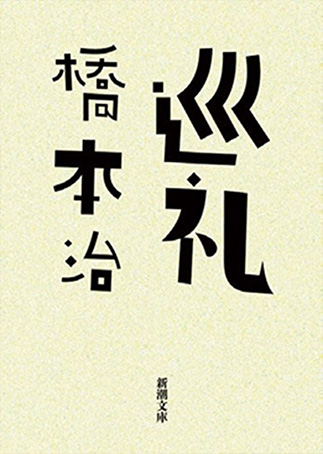
FICTION
Junrei
[Pilgrimage]
Shinchōsha (Shinchō Bunko), 2012. 289 pp. ¥490. ISBN 978-4-10-105417-9.
Also published in: French
Today’s young Japanese minimalists, who wish only for their smartphones and a small set of bare essentials to accompany them, may think of paper books and fashionable clothes as inherently undesirable rubbish. At the same time, we cannot ignore the existence of the nation’s compulsive hoarders, living in houses overflowing with trash they cannot discard.
The novel’s protagonist, a man in his seventies, is possessed by the obsessive belief that discarding a thing “transforms and eradicates all meaning from the time I’ve lived.” Having experienced Japan’s World War II defeat as a sensitive youth, Tadaichi appeared destined to lead an innocuous existence as the inheritor of a hardware shop in suburban Tokyo. Yet his son died, his wife left him, and the family business fell behind the times with the end of the country’s high-growth period, leading to an ugly present. The novel uncovers the background to his personal situation while telling the postwar history of the outskirts of the capital.
When families and society are on an upward trend, there is no end to renewal and rejuvenation. Once they start to decline, however, people are subjected to emotional instability and their desire for living is eroded. The refuse that ordinarily passes out of our lives with the times begins to pile up. . . . The story of one man’s ruin cuts to the heart of the issues that are inherent in the end of our modern, mass-consumption society, providing considerable food for thought. (OM)
The novel’s protagonist, a man in his seventies, is possessed by the obsessive belief that discarding a thing “transforms and eradicates all meaning from the time I’ve lived.” Having experienced Japan’s World War II defeat as a sensitive youth, Tadaichi appeared destined to lead an innocuous existence as the inheritor of a hardware shop in suburban Tokyo. Yet his son died, his wife left him, and the family business fell behind the times with the end of the country’s high-growth period, leading to an ugly present. The novel uncovers the background to his personal situation while telling the postwar history of the outskirts of the capital.
When families and society are on an upward trend, there is no end to renewal and rejuvenation. Once they start to decline, however, people are subjected to emotional instability and their desire for living is eroded. The refuse that ordinarily passes out of our lives with the times begins to pile up. . . . The story of one man’s ruin cuts to the heart of the issues that are inherent in the end of our modern, mass-consumption society, providing considerable food for thought. (OM)

Translation rights inquiries
Inquiries regarding European languages:
Bureau des Copyrights Français
(attn. Myriam Dartois)
3-26-4-903 Hongō, Bunkyō-ku, Tokyo
113-0033
Tel.: +81-3-5840-8871
Fax: +81-3-5840-8872
Email: myriam.dartois@bcf-tokyo.com
Inquiries regarding other languages:
Shinchōsha Publishing Co.
(attn. Overseas Publications Section)
71 Yarai-chō, Shinjuku-ku, Tokyo 162-8711
Email: ops@shinchosha.co.jp
(When sending an e-mail, please enter a half-width character "@" instead of a full-width character "@.")

